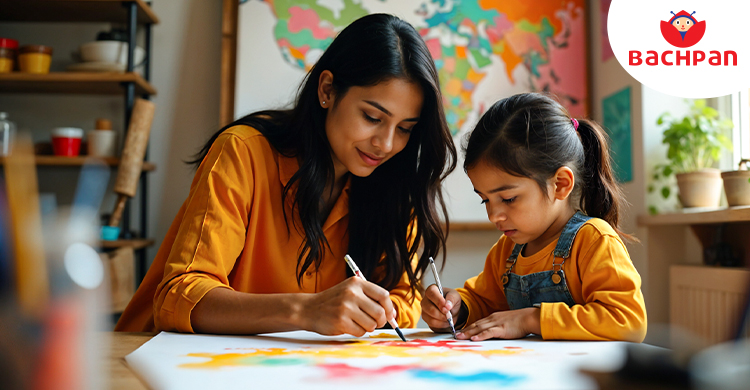10 Ways How To Reduce Screen time Of Your Child

Does your child spend more time on screen than with you? Kids these days have become habitual users of digital devices. Looking at a screen for long hours and sitting in one position can affect your child’s eyesight and overall health. It is necessary to reduce screen time for your child by indulging them in various physical activities. Let’s find ways to reduce kids’ newfound obsession with the internet and electronic gadgets.
Understanding the Impact of Excessive Screen Time
Looking at a screen for long hours directly affects a child’s eyesight. While maintaining the whole focus on the screen and sitting in one position for a long time impacts a child’s posture. Not indulging in physical activities at a growing age may lead to other lifestyle disorders and behavioural changes in a child.
Effects of Screen Time on Physical Health
Physical activity is very important for everybody, especially for a child. But since the addiction to devices is so strong, children rarely go out these days, resulting in a lack of physical movement in their daily routines. This leads to health issues like a high risk of obesity, poor eyesight, weak muscles, and poor posture, leading to long-term health problems.
How Screen Time Affects Mental and Emotional Well-being
Long screen time impacts a child’s mental health in many ways. The child loses concentration in other activities and might go through behavioural changes. It can lead to addiction to the Internet and social media, sleep disturbances, and dependency, creating emotional distress and inhibiting healthy development. For example, kids these days don’t have their meals without having a screen in front of them.
Social and Behavioural Impacts of Too Much Screen Time
A child who is on the screen most of the time usually suffers from social isolation, which may lead to a lack of social skills and communication issues. Staying at home most of the time and having no friends can result in poor interpersonal skills. Kids might become stubborn and cranky.
(Also Read, Prevention of smartphone addiction in kids- Need of the hour )
10 Practical Ways to Reduce Your Child’s Screen Time
Given the many negative impacts of longer screen time on children, parents must find effective ways to limit their children’s screen time from an early age. For children aged 0-2, it is recommended to avoid devices altogether, and for children aged 2-5, limit screen time to one hour per day. As a parent, you need to reduce your child’s screen time to avoid any addiction from an early age, especially in the growing years.
1. Set Clear and Consistent Screen Time Limits
Be strict about your child’s device usage. Maintain a productive daily routine. Set a specific time each day or week for screen time. Include other activities as well. This will make the day more organised and provide your child with enough time for everything.
2. Encourage Outdoor Play and Physical Activities
Take your child for outdoor activities. Go for a rejuvenating nature walk. Encourage them to make friends and play outside. Playing sports or indulging in physical activities from foundational years supports muscle development, improves coordination, and teaches teamwork. Teach them swimming, cycling, or other athletic activities from an early age, as this will promote physical development.
3. Replace Screen Time with Engaging Hobbies
Try to build a hobby or interest in your child. Experiment by involving them in different activities like reading books, playing sports, playing word puzzles, doing arts and crafts, dancing, or gardening. Involve them in activities that foster cognitive growth and creativity and what interests them.
4. Establish Tech-Free Zones at Home
Set spaces in your home where no device will be allowed. Communicate the rules clearly to each member of the family. Instead, fill that space with analogue activities. Play board games, read books, and communicate with your child on various topics of their interest.
5. Create Family Screen-Free Time
Create family screen time. You can choose any time during the weekends or whenever it fits right into your schedule. Watch movies that interest your kids or watch informative videos with them that will support fun learning, fostering family bonding and quality time.
6. Use Educational Content Sparingly
You can make screen time healthier by adding quality to it with informative, educational content. Use educational content sparingly so that your child can learn new things while being on screen. Instead of putting content that serves the purpose of entertainment only, you can put other age-appropriate learning videos or movies that teach values and skills to your child.
7. Lead by Example with Your Own Screen Time
Kids love to imitate their elders, and learning is taught through example. So, lead them through your actions and set an example for your kids. Limit your own screen time. Get involved with your child and show them how to maintain a balance between digital life and real life.
8. Encourage Social Interaction Without Screens
Take your kids out in parks for playdates. Encourage them to make friends. Talk to them freely. Encourage open communication, and be the friend your child wants. This will help them develop soft skills. Encourage their participation in school activities or other extracurricular activities.
9. Reward Screen-Free Activities
Use positive reinforcement techniques to promote good behaviour in your child. Appreciate their efforts in screen-free activities by rewarding them with small gifts or through words of encouragement. This will make them feel appreciated, and they are more likely to go for screen-free activities again.
10. Stay Consistent and Patient with Your Approach
Be patient and consistent in your efforts to reduce screen time. Maintaining a routine will help your child adapt over time. Create consistent routines with designated screen time slots. Actively engage your child in alternative activities, and be patient with the struggles you face while consistently enforcing the rules.
Benefits of Reduced Screen Time for Your Child
Reducing screen time has so many benefits in the long run. Once your child starts getting involved in other activities, you will be able to see the results and positive changes. Active engagement in other analogue activities can result in improved sleep cycles, enhanced social skills, and parent-child bonding.
Improved Sleep and Better Focus
Limiting screen time, especially before bedtime, helps your child sleep better and wake up more refreshed. It can keep the child focused throughout the day. Better sleep and less screen time will help alleviate anxiety and keep your child more energetic and engaged in other activities.
Better Physical Health
Reduced screen time allows more opportunities for physical activity, leading to better overall health, a stronger immune system, and improved posture. Doing more physical activity leads to more muscle movement, reducing the risk of obesity in early childhood and building healthy muscles.
Stronger Family Bonds and Social Skills
Spending less time on screens encourages more family interactions, fostering stronger bonds and better communication skills. Inculcate moral learning and improve the understanding of emotions in young children.
Conclusion
Limiting screen time from an early age will help prevent your child from getting dependent and addicted to mobile phones or other devices. Reducing screen time for your child is not just about limiting their access to devices but creating opportunities for holistic growth. By encouraging physical activities, fostering social connections, and leading by example, parents can help children build a healthy balance between digital and real-life experiences. With improved sleep, better focus, stronger social skills, and enhanced family bonds, your child will thrive in a nurturing environment that prioritizes their overall well-being.
At Bachpan Play School, we understand the importance of balancing screen time and physical activity for a child’s healthy development. Through our well-researched SPROUT curriculum, we ensure that children are engaged in activities that promote cognitive, emotional, and physical growth. A healthy, screen-free lifestyle is crucial in early childhood, and we help parents foster this balance while providing quality education to shape a brighter future for their children.
(Also Read, What’s New in Bachpan’s SPROUT Curriculum for Preschoolers? )





